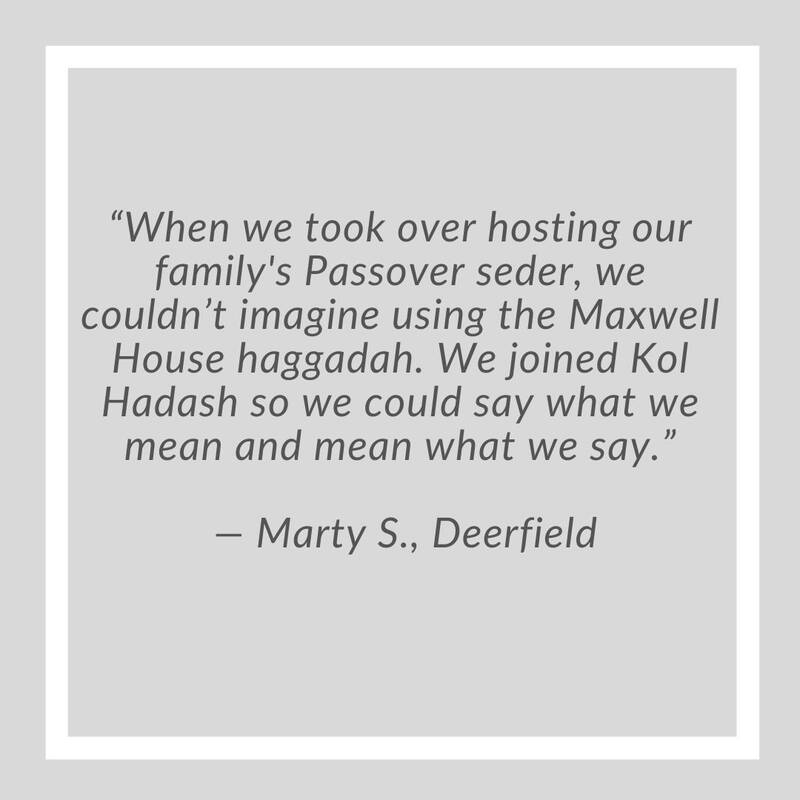Passover
We celebrate Passover as a cultural tradition of storytelling and freedom, includingthe freedom to choose how we celebrate our Jewish culture. Instead of a long, traditionalHebrew seder because “that’s the way it’s always been done,” our Humanisticcelebration appeals to less-observant Jews by exploring the meaning behindthe holiday traditions and adapting them for today.
Why is Our Passover Seder Different
from All Other Seders?
1. Our retelling of our ancient stories emphasizes the power of human beings to affect their destiny and is a universal call for human rights and dignity.
2. Although we do not recognize the story of the Exodus as historically accurate, we choose to tell it to remind us how Jewish people, even in recent times, have survived oppression through their human fortitude and resilience.
3. Because we believe that we are in charge of our own lives without supernatural intervention, our blessings over the wine, matzah, and items on the seder plate connect us to Jewish tradition while recognizing the natural world and human involvement in the celebration of these symbols.
4. In addition to singing “Dayenu” (“it would be enough”), we also sing “Lo Dayenu” (“it would not be enough”), reminding us that there is still more to do to “let freedom ring.”
5. Our Humanistic Haggadah reflects our values and beliefs while preserving familiar melodies that connect us to our heritage.
6. Our Passover Seder is a welcoming, no-obligation introduction to Humanistic Judaism which appeals to people who identify as Culturally Jewish, Just Jewish, Jew-ish, Jewish and . . . , Half-Jewish, Jews by Choice, Multicultural, Not Religious, Secular, Humanistic, Atheist, and/or Agnostic. No prior knowledge or Jewish literacy is needed; come as you are!
7. Rabbi Chalom leads a seder on the second night of Passover at a restaurant which is open to everyone – members and their guests and non-members. It’s a great way to celebrate the holiday together as a community.
Passover Seder and Registration
Sunday, April 13, 5:00 pm
Join us at Bluegrass Restaurant in Highland Park on the second night of Passover for a meaningful Passover Seder with Rabbi Adam Chalom and enjoy a family-style dinner. Space is limited.
If you have questions or are interested in ordering a Humanistic Haggadah, please contact our administrator, Jeremy Owens, at info@KolHadash.com, or 847/383-5184.
Passover Family Seder
Sunday, April 6, 10:30-11:30 am
Kol Hadash Sunday School at Deerfield High School1959 N. Waukegan Road, Deerfield
Our fun and relaxed Family Seder is intended for children of all ages to learn about Passover's interesting history, customs and special foods using our Humanistic Haggadah for our Passover Family Seder.
Learn more about:
Humanistic Passover celebrations on the Society for Humanistic Judaism’s website.
You might enjoy these articles by our Rabbi Chalom on “Secular Passover Values” and “Commemorating Fiction: Passover Complications.”
Questions? Contact our administrator, Jeremy Owens, at (847) 383-5184 or info@KolHadash.com.
Passover FAQ
1. Is there a Humanistic Haggadah?
There are several! Our Community Seder uses The Liberated Haggadah by Rabbi Peter Schweitzer — printed copies are provided to participants for use during the seder, electronic copies are available through this website. You can also download a copy of our Humanistic Haggadah for our Passover Family Seder.
In addition, our national Society for Humanistic Judaism offers several haggadot (plural of “haggadah”) for sale on their website. You can also find many Humanistic readings included on the “make your own haggadah” website www.haggadot.com.
2. How long are your seders?
Jewish celebrations exist to meet important human needs, and hunger is very important! Our Sunday School Passover Family Seder is 45 minutes long, and our Community Seder generally runs an hour before dinner (often 5:30pm-6:30pm), with another 15 minutes or so after the meal.
3. Do you follow Passover dietary rules?
Just as with general kosher rules, health guidelines and ethical eating choices all year long, Humanistic Jews make their own determination of what they choose to eat. Our Sunday School Passover Family Seder and our Community Seder serve traditional Passover foods (though not strictly kosher or Passover-kosher).
4. What do people typically wear to your seder? Do you wear a head covering (kippah/yarmulke)?
There is no dress code — some wear suits or dresses, others wear sport coats, dress shirts, skirts or slacks. Children are welcome to wear whatever they negotiate with their adults! While Rabbi Chalom and most of our members choose not to wear head coverings, individuals may wear what makes them comfortable.
5. Can my family attend without being members?
Yes! We welcome non-members.
6. What does it cost to attend as a non-member?
Our Sunday School Passover Family Seder is free. For the Community Seder on the second night of Passover, there is a fee to cover the dinner at Bluegrass Restaurant in Highland Park. The exact cost per person will be on the registration page.
7. Are you welcoming of interfaith, intercultural and LGBTQ+ families and individuals?
Yes! We firmly believe that everyone should affirm and celebrate who they are, and we celebrate the diversity of today’s Jewish families. Regardless of background or identity, all are encouraged to participate fully.
8. Do we need to know Hebrew to participate?
No Hebrew knowledge required. Rabbi Chalom translates what needs translating, and our songs written in Hebrew (or Yiddish) also appear in English letters for pronunciation.
9. What ages are appropriate for which seders?
Our Sunday School Passover Family Seder is appropriate for our Sunday School age population: ages 5-15. Younger siblings are very welcome to attend with their families. Our Community Seder welcomes all ages, but it may be more appropriate for children able to follow our Haggadah.Questions? Contact our administrator, Jeremy Owens, at (847) 383-5184 or info@KolHadash.com.

